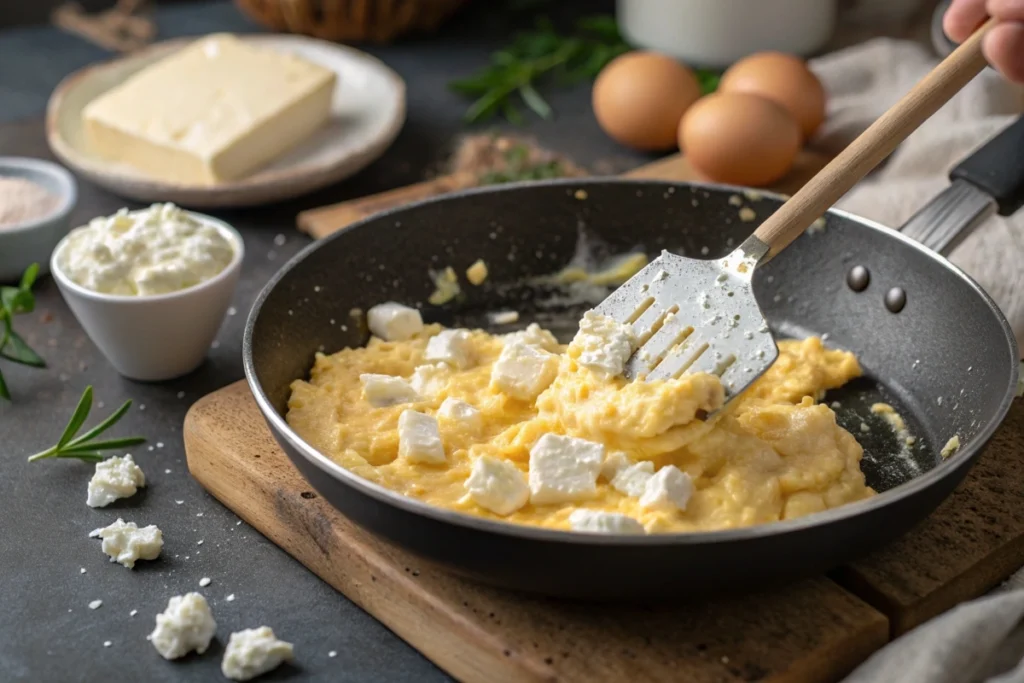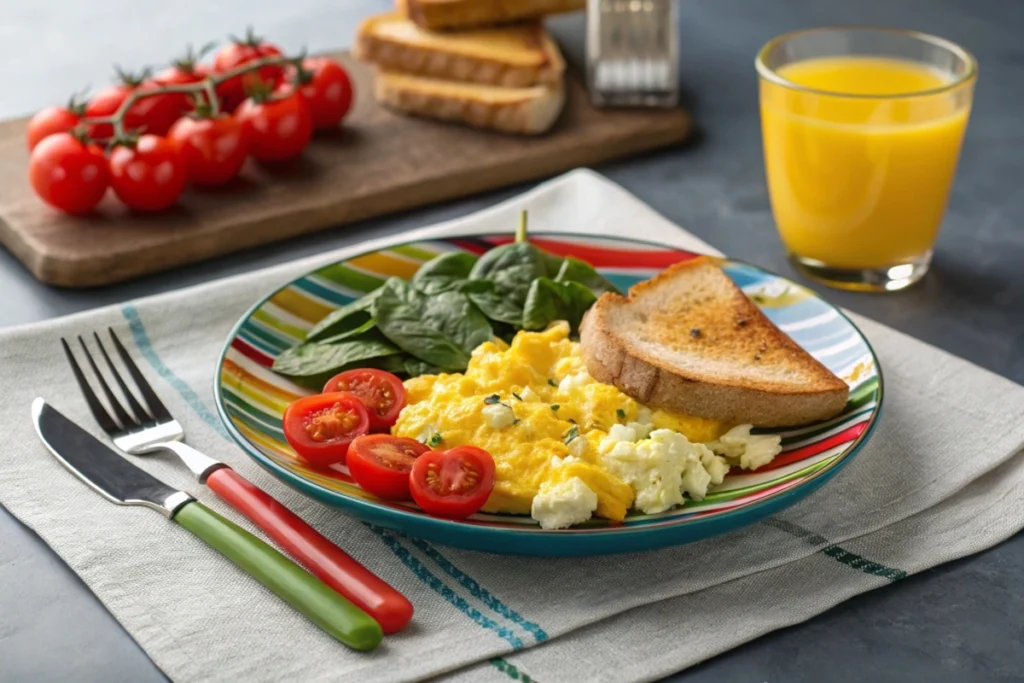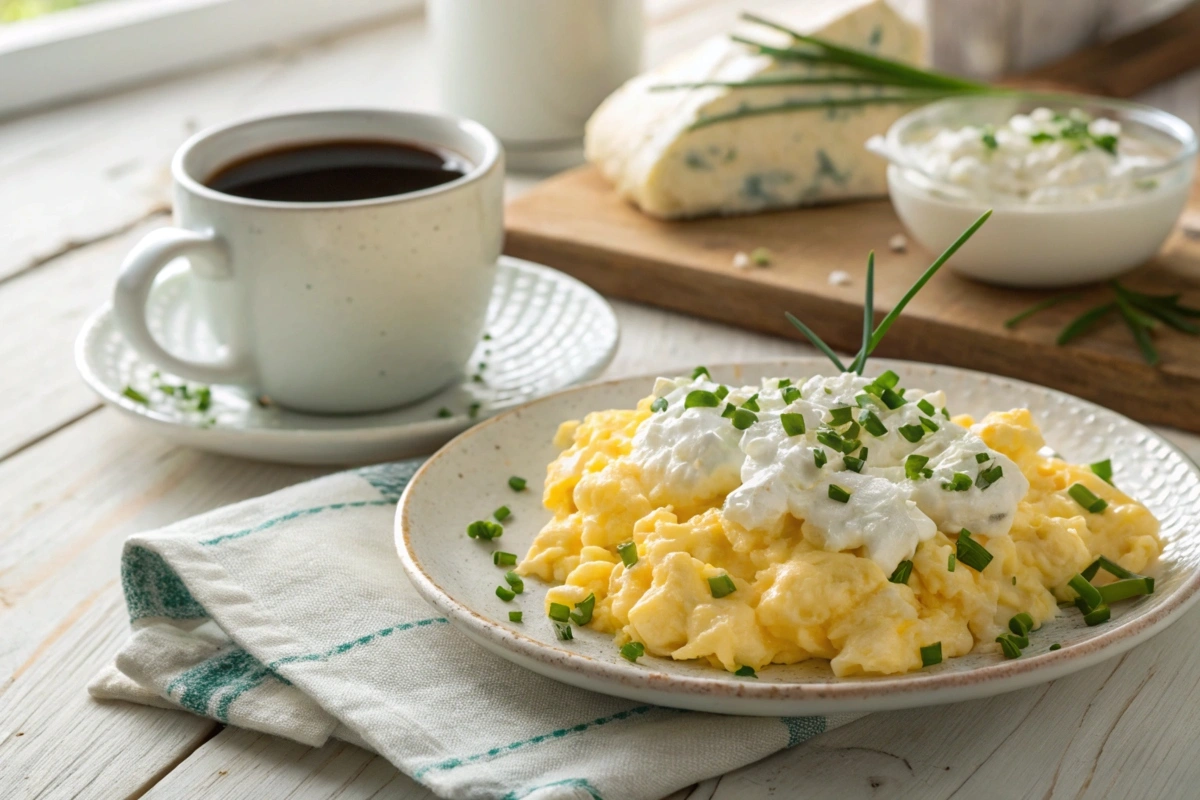Creamy, fluffy, and packed with protein—discover how cottage cheese elevates everyday scrambled eggs.
Introduction
Scrambled eggs are a staple breakfast food in countless American households. They are simple, satisfying, and versatile. However, many home cooks still wonder: is cottage cheese good in scrambled eggs? The idea might sound unusual at first. Yet, countless enthusiasts praise the added creaminess and nutritional boost cottage cheese brings. Indeed, cottage cheese has found its place in various recipes, but how well does it actually pair with eggs? This comprehensive guide will delve into every facet of combining these two delightful ingredients.
Specifically, it will walk you through essential techniques, highlight critical health benefits, offer creative recipe variations, and tackle commonly asked questions. By the conclusion of this guide, you will not only understand how to elevate scrambled eggs with cottage cheese but also appreciate why this combination could redefine your breakfast experience forever.
Is Cottage Cheese Good in Scrambled Eggs: Understanding the Basics
The question is cottage cheese good in scrambled eggs has gained traction among food lovers. Many are curious if adding cottage cheese is truly worthwhile. After all, scrambled eggs are already a quick protein option. Why add another dairy element to the equation?
To grasp the basics, consider the nature of both foods. Eggs are light and delicate when cooked correctly. Cottage cheese, on the other hand, has a mild flavor and a slightly lumpy texture. When these two are combined, the lumps often melt down during the cooking process. This results in a subtle tang that can elevate the flavor profile.
Cottage Cheese in Your Scrambled Eggs: The Simple Science
- Mild Flavor: Cottage cheese carries a gentle, creamy taste that does not overpower the eggs.
- Textural Contrast: Its curds add a pillowy softness to the normally fluffy eggs.
- Nutrient Boost: Cottage cheese is high in protein, calcium, and B vitamins.
Is cottage cheese good in scrambled eggs from a consistency standpoint? Absolutely. The moisture in cottage cheese can lighten the texture of your eggs, preventing them from becoming too firm or rubbery. Consequently, you get a velvety bite in each mouthful.
Flavor Profile
Cottage cheese is slightly tangy and milky. It pairs well with eggs, which are known for their neutral taste. The combined flavor is neither too bold nor too bland. Instead, it strikes the perfect balance. Many people find this balance delightful, especially if they do not enjoy strong cheese flavors like sharp cheddar or blue cheese.
Culinary History
Cheese and eggs have been paired for centuries, though cottage cheese has not always been the first choice. Hard cheeses, such as cheddar or Swiss, have often taken the spotlight. However, more home cooks are discovering the subtle charm of cottage cheese. To see why, it helps to understand cooking fundamentals and find the best ways to incorporate it.
Is Cottage Cheese Good in Scrambled Eggs: Cooking Techniques
Successfully combining cottage cheese with eggs requires knowing how to handle each element. Because scrambled eggs cook quickly, the technique matters.
- Choose Fresh Cottage Cheese
Initially pick a high-quality brand. Look for short ingredient lists and minimal additives. Cottage cheese with fewer preservatives usually has a fresher, creamier texture. - Drain Excess Liquid
Cottage cheese often has a watery residue; therefore, draining off the extra liquid ensures that your scrambled eggs will not become runny. That is crucial if you want a fluffy consistency. - Be Mindful of Heat
Cook your scrambled eggs over medium or medium-low heat. If the temperature is too high, the eggs may become rubbery before the cottage cheese has time to integrate. - Fold, Do Not Overmix
Initially, whisk your eggs. Then, incorporate the cottage cheese gently. Overmixing can break down the structure. A few folds are usually enough to combine ingredients. - Season Wisely
Add salt and pepper gradually. Cottage cheese has its own mild saltiness, especially if you are using a standard variety. Taste as you go.

Is Cottage Cheese Good in Scrambled Eggs: Common Mistakes to Avoid
Many people wonder is cottage cheese good in scrambled eggs, only to have a negative experience at first because of a few basic mistakes.
- Overcooking: Eggs firm up quickly; however, if they are left on high heat for too long, you might end up with a rubbery texture.
- Using Too Much Cottage Cheese: Balance is key. Certainly too much cottage cheese can overshadow the eggs or lead to soggy results.
- Skipping the Drain: Failing to drain any liquid from cottage cheese can yield watery eggs.
- Neglecting Seasoning: The tang of cottage cheese is subtle; therefore, adding other flavors or seasonings can significantly enhance the dish.
Avoid these pitfalls, and you will likely have a delightful experience with scrambled eggs that feature cottage cheese.
Is Cottage Cheese Good in Scrambled Eggs: Health and Nutritional Insights
In discussions surrounding is cottage cheese good in scrambled eggs, nutrition often tops the list of concerns. Indeed, both eggs and cottage cheese pack a strong nutritional punch. However, are they healthy in combination?
Eggs are a high-quality protein source. They contain essential amino acids, vitamins, and minerals such as vitamin D, choline, and iron. Cottage cheese is also protein-packed, and it brings calcium, potassium, and vitamins like B12 and riboflavin to the table. Combining them can significantly boost your breakfast protein intake. That can be especially beneficial for individuals aiming to maintain muscle mass or stabilize their blood sugar.
Low-Fat vs. Full-Fat Cottage Cheese
- Low-Fat: Typically has fewer calories and less saturated fat. However, the texture might be slightly watery.
- Full-Fat: Richer taste and creamier consistency. Contains more calories and saturated fat.
Those trying to cut calories may opt for low-fat cottage cheese. Nonetheless, the full-fat variety offers a more luxurious taste. Both can work well. It all depends on your dietary goals and flavor preferences.
Nutritional Content
Below is a general nutritional breakdown of scrambled eggs with cottage cheese, based on a 100g serving. However, it’s important to note that these values can vary depending on several factors, such as the brand of cottage cheese, the size of the eggs used, and any additional ingredients like milk or butter. Moreover, preparation methods can also influence the nutritional content, making it essential to check specific labels or recipes for accurate details.
| Nutrient | Amount (Per 100g) |
|---|---|
| Calories | 160 kcal |
| Protein | 13 g |
| Fat | 10 g |
| Carbohydrates | 3 g |
| Calcium | 100 mg |
| Sodium | 280 mg |
| Vitamin B12 | 1.2 µg |
| Choline | 150 mg |
These figures are approximate. They provide a snapshot of why this combination can be both satisfying and nourishing. Eggs supply complete protein, while cottage cheese adds calcium and further protein content.
Is Cottage Cheese Good in Scrambled Eggs: Recipe and Variations
Certainly! Here’s the revised version with added transitional words for better flow:
To address the question, is cottage cheese good in scrambled eggs, perhaps the best way is by trying a straightforward recipe. In this section, we will first cover a simple approach and then offer suggestions for creative twists to enhance your dish further.
Ingredients
- 4 large eggs
- ¼ cup cottage cheese (small curd or whipped for smoother texture)
- 1 tablespoon butter (or olive oil for a lighter option)
- ¼ teaspoon salt (adjust to taste)
- ⅛ teaspoon black pepper
- ¼ teaspoon garlic powder (optional, for extra flavor)
- 1 tablespoon chopped chives or green onions (optional, for garnish)
Step-by-Step Expanded Cooking Instructions
- Whisk the eggs: In a medium bowl, beat the eggs until smooth. Stir in the cottage cheese, salt, pepper, and garlic powder (if using).
- Heat the pan: Place a nonstick skillet over medium-low heat and add the butter. Let it melt and coat the pan.
- Cook the eggs: Pour the egg mixture into the pan. Let it sit for about 30 seconds, then gently stir with a spatula, folding the eggs from the edges toward the center.
- Low and slow: Continue cooking over low heat, stirring occasionally, until the eggs are soft and slightly undercooked. Remove from heat—they will continue cooking from residual heat.
- Serve: Transfer to a plate and top with chopped chives or green onions. Enjoy immediately!
Scrambled Eggs with Cottage Cheese: Flavor Variations
- Tomato and Basil: Mix in chopped cherry tomatoes and fresh basil for a lighter, Mediterranean feel.
- Spinach and Garlic: Sauté spinach with a little garlic before adding eggs and cottage cheese.
- Mushroom and Onion: Cook sliced mushrooms and onions until caramelized. Fold them into your eggs for an earthy flavor.

Is Cottage Cheese Good in Scrambled Eggs: Flavor Pairings
If you are still asking yourself is cottage cheese good in scrambled eggs, consider expanding the flavor profile. Indeed, eggs and cottage cheese together are a canvas for a wide range of herbs, spices, and vegetables.
- Herbs: Chives, parsley, or dill can add a bright note.
- Spices: Paprika, chili flakes, or turmeric can bring color and zing.
- Vegetables: Spinach, onions, mushrooms, or bell peppers can add both nutrition and variety.
When you pair cottage cheese with additional ingredients, it forms a harmonious dish with balanced textures. Do not be afraid to experiment. You might discover a new family favorite that debunks any hesitation over is cottage cheese good in scrambled eggs.
Is Cottage Cheese Good in Scrambled Eggs: Storage and Leftovers
Scrambled eggs are typically best enjoyed fresh. However, leftover portions can be stored. Place them in an airtight container and keep them in the refrigerator. They usually last for up to two days.
Tips for Reheating
- Use a microwave at 50% power, stirring gently every 20 seconds.
- Add a small splash of milk or water to prevent dryness.
- Avoid overheating, as it can make the eggs rubbery.
If you plan to make a large batch, consider storing them in smaller portions. This helps maintain flavor and consistency upon reheating.
Is Cottage Cheese Good in Scrambled Eggs: Frequently Asked Questions
- Why put cottage cheese in eggs?
Many cooks add cottage cheese to eggs for extra creaminess and protein. The cheese melts slightly and blends into the eggs, giving a smoother texture. It also imparts a mild tang that can elevate the overall flavor. Basically, it transforms ordinary scrambled eggs into a velvety, protein-rich meal. - What kind of cheese goes well with scrambled eggs?
Numerous cheese varieties can work, including cheddar, mozzarella, or feta. However, cottage cheese offers a softer taste and an airy texture. That makes it an appealing choice for individuals who prefer lighter flavors. Conversely, sharp cheddar might be better for those seeking a bolder taste. - What does Gordon Ramsay put in his scrambled eggs?
Gordon Ramsay often stresses the importance of butter and a gentle heat. He also frequently adds crème fraîche to enhance creaminess. While he may not specifically mention cottage cheese, the principle is similar. You want an ingredient that contributes creaminess without overcooking. Cottage cheese can serve a similar purpose if used wisely. - Why are my eggs watery when I add cottage cheese?
Watery eggs often result from excess liquid in cottage cheese. Draining the cheese before mixing helps. Another issue could be cooking temperature. If the pan is too hot, the eggs might release extra moisture. Consequently, you end up with a runny texture. Gently cooking at medium-low heat and thoroughly draining the cheese usually solves this problem.
Now you know the answer to is cottage cheese good in scrambled eggs. Indeed, it offers a creamy twist that stands out from typical cheese add-ins. You can enjoy a higher protein content and a subtle tanginess, all while maintaining a fluffy texture. Cooking techniques matter, so remember to drain any excess liquid, keep the temperature moderate, and avoid overmixing. If you do so, you will savor a restaurant-quality breakfast in the comfort of your home.
Moreover, feel free to explore the many flavor variations. Add fresh herbs, vegetables, or spices to personalize your dish. The versatility of scrambled eggs means you can keep reinventing them. With cottage cheese, you have found one more delicious reason to love your morning meal. So go ahead, try it, and experience how a simple ingredient can transform a beloved classic.
Print
Is Cottage Cheese Good in Scrambled Eggs: A Creamy Twist
- Total Time: 10 minutes
- Yield: 2 servings 1x
Description
These creamy and protein-packed scrambled eggs are elevated with the addition of cottage cheese, creating a fluffy, velvety texture with a rich yet light taste. The slight tang of the cottage cheese blends beautifully with the buttery eggs, making for a nutritious and satisfying breakfast. Perfect for those looking to add extra protein to their morning meal while keeping it quick and simple.
Ingredients
- 4 large eggs
- ¼ cup cottage cheese (small curd or whipped for smoother texture)
- 1 tablespoon butter (or olive oil for a lighter option)
- ¼ teaspoon salt (adjust to taste)
- ⅛ teaspoon black pepper
- ¼ teaspoon garlic powder (optional, for extra flavor)
- 1 tablespoon chopped chives or green onions (optional, for garnish)
Instructions
-
Whisk the eggs: In a medium bowl, beat the eggs until smooth. Stir in the cottage cheese, salt, pepper, and garlic powder (if using).
-
Heat the pan: Place a nonstick skillet over medium-low heat and add the butter. Let it melt and coat the pan.
-
Cook the eggs: Pour the egg mixture into the pan. Let it sit for about 30 seconds, then gently stir with a spatula, folding the eggs from the edges toward the center.
-
Low and slow: Continue cooking over low heat, stirring occasionally, until the eggs are soft and slightly undercooked. Remove from heat—they will continue cooking from residual heat.
-
Serve: Transfer to a plate and top with chopped chives or green onions. Enjoy immediately!
Notes
- Variations: Add shredded cheese, cooked bacon, or sautéed vegetables for extra flavor.
- Dairy-Free Option: Substitute cottage cheese with a dairy-free alternative or skip it entirely.
- Extra Creamy Texture: Use whipped cottage cheese for an ultra-smooth consistency.
- Serving Suggestions: Pair with avocado toast, fresh fruit, or a side of crispy bacon for a well-rounded breakfast.
- Prep Time: 5 minutes
- Cook Time: 5 minutes
- Category: Breakfast
- Method: Stovetop
- Cuisine: American
Nutrition
- Serving Size: ½ of recipe
- Calories: ~200 kcal
- Sugar: ~1g
- Sodium: ~350mg
- Fat: ~14g
- Saturated Fat: ~6g
- Unsaturated Fat: ~7g
- Trans Fat: ~0g
- Carbohydrates: ~2g
- Fiber: ~0g
- Protein: ~16g
- Cholesterol: ~340mg

